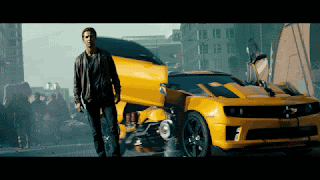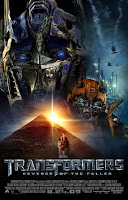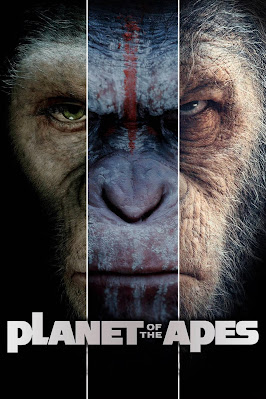As far as today's movie franchises go, it seems that just about any series, let alone an installment, can turn a profit, no matter what audiences and/or critics can say against it. The same goes for series' of films that start out well, yet never manage to reclaim the same level of quality or relevance subsequently. From sharks terrorizing small beach towns (
Jaws) to average-Joe cops at the wrong place at the wrong time (
Die Hard) to Caped Crusaders stalking criminals at night (the
Batman movies of the '80s and '90s) to pirates blazing the seas (
Pirates of the Caribbean) to dinosaurs running amok at a planned theme park (
Jurassic Park) to giant robots smashing the life out of each other (
Transformers), said follow-ups still manage to be financially successful.
Which brings me to talk about the latter example.
As just about everybody else can agree, the
Transformers franchise (a.k.a. the record-breaking, Michael Bay-directed series, which said director has reportedly concluded with the recently-released fifth installment,
The Last Knight) exists off of a popular Hasbro toy brand and T.V. franchise from the '80s. And the films certainly have their many moments of visual sophistication and explosive entertainment. Yet, unlike the popular T.V. series of the 1980s (and despite the anticipation and high hopes surrounding each sequel, including my anticipations for each of them), these films exponentially abandon any childlike wonder of kids playing with action figures and go for straight-up intensity. And they seem to have hit a series' low with
The Last Knight. (And that's not just critics, audiences and the box office talking.)
In a story that makes almost no sense,
The Last Knight attempts to tell the "secret history of Transformers" is chronicled all the way back to Medieval times, and even expands throughout significant turning points in world history, including Nazi Germany. Then there's Optimus Prime going against his moral code (a la Vin Deisel in
Fate of the Furious) in a plot to bring a destroyed Cybertron to Earth, Mark Wahlberg as an on-the-run mechanic who is chosen by a fallen robot knight as a new sword barrier (am I getting flashes of
Green Lantern here?), a teenage girl who wishes to fight in an ongoing battle between man and machines, Anthony Hopkins as an English lord who searches for clues from the aforementioned "secret history," and an Oxford professor who turns out to be the last descendant of Merlin.
Come to think of it, the
Transformers movies have not always been strong on story, let alone coherence. And they try to make it up here yet again with explosive action sequences and groundbreaking IMAX 3D technology (which, in and of itself, is undeniably impressive). But why not coherence? Why not the childlike wonder? Why not a sense of real optimism as
Wonder Woman had? The resulted film makes the other Transformers movies (with the exception of
Revenge of the Fallen) look like masterpieces.
I recently recapped on the previous films, and attempted to dissect any "story" in each of them. The first
Transformers (2007), for instance, was released as America was at war with Iraq. Arguably, the movie reverently portrays soldiers at the time, while briefly showcasing the history of the war between the Autobots (the good guys) and the Decepticons (the bad guys). The film itself was criticized for devoting less time to the robots and more to its thin and ridiculous plot (written by screenwriting duo Roberto Orci and Alex Kurtzman, who would go on to successfully reboot
Star Trek for director J.J. Abrams). For one, there's the goofy subplot involving Shia LeBeouf and Megan Fox (with unnecessary--or, as one review called it,
dismaying--sexuality in a movie otherwise based on kids' toys). Teo Bugbee of The Daily Beast
said the film "was a bit vulgar and a bit sexist and a bit dumb, but it wore its Spielbergian influences on its sleeve." (Steven Spielberg is an executive producer on this series.)
On the other hand, the mythology behind machinery from out of this world and that on earth, as well as the latter's humanity, does break through, including a character who learns he comes from an important and incredible ancestry. ("No sacrifice, no victory" is this family's mantra.) Plus, the limited screen time for the robots does make the finished film more anticipating a la
Jaws or
Jurassic Park. The most appealing and emotional character (even more than Optimus Prime) is arguably Bumblebee, which Spielberg must have influenced considering the "boy and his car" appeal, a rare case of sympathy for an inanimate object.
The first sequel,
Revenge of the Fallen (2009), had a teaser trailer that promised the entertainment goods. What audiences (and critics) got was a rotten two-and-a-half hours of mind-numbing, bombastic, and ear-shattering mayhem (er, Bayhem) and surprisingly crass content. Did I mention there are a duo of stereotypically-offensive twin robots? And don't get me started on the parade of female objectification that rolls out, including but not limited to a reprised Megan Fox.
Plot-wise (if there is one), the movie tries to be too many things at once: a military movie, a dopey college, teenage-sex comedy; a special-effects movie; and an epic adventure set in China and Egypt, but with robots smashing and ripping each other apart. The late Roger Ebert compared this film to banging kitchen pots repeatedly, in order to spare readers the $10 required for a movie ticket. (Read
here.) PluggedIn.com
wrote, "[This film] comes with no pretensions of greatness. It's not written to make you think, not crafted to make you cry. Its sole intent is to get moviegoers to fork over their 10 bucks and sit still for two-and-a-half hours. That said, I was surprised at how cold this movie left me." The convoluted subplot has characters going to so much trouble for various things (including a "Devestator" Decepticon that uses a bunch of vehicles to get together, only to be blown up a while later), and all at the expense of showing off fireworks and fighting and all. It's ironic that one soldier, in the heat of a battle, states, "You better have a good reason for us to be here" (as if any moviegoer were strangely asking Bay the same question).

What the movie should have focused more on was the military subplot involving Autobots and soldiers working together and less or none on the dopey comedy and crass sexual content. I do give Bay credit, though, for filming at real locations (and with IMAX cameras for some sequences), such as the pyramids of Giza in Egypt, and for doing so many of his action sequences for real. And while there are some noteworthy sacrificial and militant moments in the film as well as a lot of visual sophistication, there's ultimately a lack of real emotional investment throughout. And for what it's worth, this is the first time I saw and read about a movie (let alone a summer blockbuster) that really allowed me to take film criticism into account.
Film three, titled
Dark of the Moon (2011), takes the space race of the 60s and injects the war between the Autobots and Decepticons (a promising start) into a plot that fictitiously enables NASA agents to send Neil Armstrong and Buzz Aldrin to the moon to investigate what's on the "dark side". This tweak in history is questionable and kind of disturbing. The plot involves Autobots continue to assist human soldiers in "human conflicts," while quirky young adult Sam Witwicky goes job hunting, landing at a company headed by John Malkovich. There are even secrets within NASA and related organizations, as human traitors partner with Decepticons to bring Cybertron to earth, as well as characters who have lost faith and have become pessimistic or misguided ("No. It's not the only way," pleads one significant character.)
The film is a visual improvement over its predecessor, with carefully choreographed and staged action sequences that are less dizzying but still unbearable. The 45-minute climax in none other than Chicago shows people being vaporized, building plummeting, and a city being destructed like a giant pinball machine, especially when a giant Driller Decepticon constricts a building in a complex and mind-rattling sequence that strangely and disturbingly echoes 9/11. Sure, we know who wins, but then, just like that, the film ends.
Just when you thought you've had enough metal mayhem (er, Bayhem) like I did then, a fourth installment, titled
Age of Extinction (2014), drops in, with a new cast (including Mark Wahlberg, Kelsey Grammer, and a standout Stanley Tucci as a Steve Jobs-type) and a new style that suggested a possibly different direction for the franchise (albeit a more gritty and human one). Interestingly, the plot involves alien robots being hunted down by human agents and soldiers, as well as an attempted father-daughter story, Optimus Prime being pursued by captures on a mission to return him to his "makers," and the ever-popular "Dinobots". The result was another meaningless romp of explosions and scrap metal. The "Transformium" element is just weird. The Autobots aren't that memorable (although Hound and Lockdown are standouts). Plus, Bumblebee doesn't seem like he's in here much. It's ironic that Tucci's character complains, "Why can't we make what we want to make the way we want to make it?!?"
There are only a few worthy moments, including those between Optimus Prime and Wahlberg's mechanic Cade Yeager ("How many more of my kind must be sacrificed for your mistakes?" "What do you think being human means? That's what we do.") And the score that plays as Prime gets an upgrade while the remaining Autobots assemble is terrific.
If this is all too much to take in, here's an attempted brief summary of each film:
Transformers (2007): A quirky high schooler witnesses the arrival of alien robots on earth, and becomes involved in a war between two races of machines.
Transformers: Revenge of the Fallen (2009): Alien robots fight alongside military soldiers against Decepticons and a new battle involving the ancient history of said alien robots (wait, they've been here before?), while a recent high school graduate goes to college.
Transformers: Dark of the Moon (2011): The history of the war between Autobots and Decepticons alters American history of the space race, while a college graduate looks for a job in corporate America.
Transformers: Age of Extinction (2014): The prehistoric history of alien robots (again, they've been here before) resurfaces as a battle between humans and remaining robots (with help from a family) ensues.
Transformers: The Last Knight (2017): The "secret history" of alien robots resurfaces as battle between humans and robots continues. (Wait, haven't we seen this before?)
 |
| Michael Bay behind the scenes of Transformers: The Last Knight |
Obviously, it's easy to criticize Michael Bay as a poor filmmaker who favors action and style over substance and character. On the other hand, the work he puts into his action sequences is what makes him, to a degree, noteworthy. Spielberg once said about Bay, "He has the best eye for multiple levels of visual adrenaline." Furthermore, he's one of the few filmmakers nowadays who prefers shooting on film and doing as many practical effects as possible. He's even pushed for the improvement of IMAX and IMAX 3D technology with each subsequent film in the series, despite all of their otherwise flaws.
Revenge of the Fallen does have some spectacular shots, as noted above. (
The Dark Knight practically revolutionized the big screen imagery a year prior, after all.) And
Dark of the Moon does benefit several examples of steady 3D and attention-to-detail.
Age of Extinction was reportedly the first film to be shot on IMAX 3D cameras, and it incorporated a lot of different camera angles and dollies made in Japan. Lastly, Bay has stated that 98 percent of
The Last Knight was shot with real IMAX 3D cameras. (Watch
here and
here.)
However, the visual effects in the first film still remain revolutionary; entertaining and exciting, even. I mean, how cool was it to see, for the first time, robots shapeshifting like Rubix cubes in and of themselves? In fact, a friend from college told me he watched the whole movie literally frame by frame just to watch the attention to detail. The combination of practical and CGI effects a la
Jurassic Park works. When the Autobots arrive, the sequence is spectacular. Even original voice actors from the cartoon series (including Peter Cullen as Optimus Prime) brought back a level of '80s nostalgia. This is the only
Transformers movie with convincing excitement, emotion, and nostalgia, along with typical action that Michael Bay has become synonymous with. (There's a great YouTube
video that discusses and critiques Bay's filmmaking style.)*
After seeing all of the other films, however, I'm convinced that my initial instincts were correct (no matter what the other trailers implied): after the first three movies, the others weren't necessary. However, I do have hopes that next year's Bumblebee spinoff (reportedly set in the '80s) will be better, and that new writers and filmmakers will take the franchise in different directions, to what made the T.V. series and action figures appealing to begin with, and "transform" them into movies actually worth watching.
*WRITER'S NOTE: The YouTube link does contain a few PG-13-level profanities in an otherwise informative discussion.





















